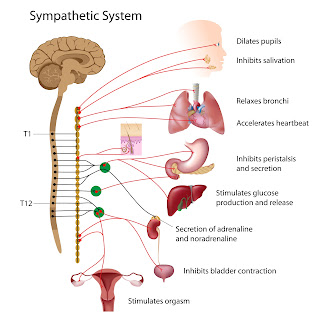 Stress is a phenomenon that every college student is all too familiar with. It can originate from the physical world, like when we are looking at an impossible problem on our Calc 3 homework, or from inside our own minds, like when we think about that internship we need to find for the summer. It is important to note that stressors can be acute or chronic, at that these two types of stress activate different physiological responses. I felt acute stress yesterday when I couldn’t find my baby kitten in my apartment for a few minutes. As I searched the rooms, my SAM axis (fight-or-flight response) was activated, increasing my heart rate, blood pressure and tensing my muscles. This kind of stress was acute because it only lasted until I found him. Other kinds of stressors are more chronic, such as debilitating diseases, prolonged unemployment, and repeated, regular painful surgeries. These chronic stressors activate the HPA axis, increasing fat storage, alertness, emotional responsiveness. The effects of chronic stress can go unnoticed and build up over time. Both kinds of stress are implicated in decreased immune system functioning and a wide assortment of illnesses.
Stress is a phenomenon that every college student is all too familiar with. It can originate from the physical world, like when we are looking at an impossible problem on our Calc 3 homework, or from inside our own minds, like when we think about that internship we need to find for the summer. It is important to note that stressors can be acute or chronic, at that these two types of stress activate different physiological responses. I felt acute stress yesterday when I couldn’t find my baby kitten in my apartment for a few minutes. As I searched the rooms, my SAM axis (fight-or-flight response) was activated, increasing my heart rate, blood pressure and tensing my muscles. This kind of stress was acute because it only lasted until I found him. Other kinds of stressors are more chronic, such as debilitating diseases, prolonged unemployment, and repeated, regular painful surgeries. These chronic stressors activate the HPA axis, increasing fat storage, alertness, emotional responsiveness. The effects of chronic stress can go unnoticed and build up over time. Both kinds of stress are implicated in decreased immune system functioning and a wide assortment of illnesses.
Physiological stress is different from attention fatigue, although some of the symptoms are the same. Both make you feel bad physically and emotionally, and both require coping mechanisms and strategies. However, attention fatigue is caused by an overuse of directed attention, whereas stress comes from a combination of internal and external, acute and chronic stressors.
Believe it or not, stress is not wholly negative. It is an adaptive mechanism that helps humans to survive. When we perceive a threat, our acute stress mechanism prepares us to fight or flee. When we worry about the future, our chronic stress mechanism may motivate us to plan, get organized, and conserve the resources that we need to succeed.
But, don’t be stressed out about stress! There are ways to cope with and reduce the stress that we feel. Since stress can originate internally, it can be modulated by changing our cognitive and affective responses to stressors that we can’t simply get rid of, like exams and boring meetings. When you’re feeling stressed, it only takes a few minutes to do some easy stress-relieving activities. Exercise, mindfulness meditation, and a pleasurable, stimulating activity like playing a game are three easy ways to reduce stress. Taking a short walk through nature will simultaneously improve your physical fitness, restore your attention, and reduce your stress. How incredible! You may feel like you don't have time for this - but everyone could and should ideally find thirty minutes a day to check-in with themselves and manage their stress before it builds up to critical levels. If you're stuck inside Mason Hall all day and need to de-stress, try breathing deeply and focusing on inhaling and exhaling, or briefly stretching your arms and legs.


No comments:
Post a Comment